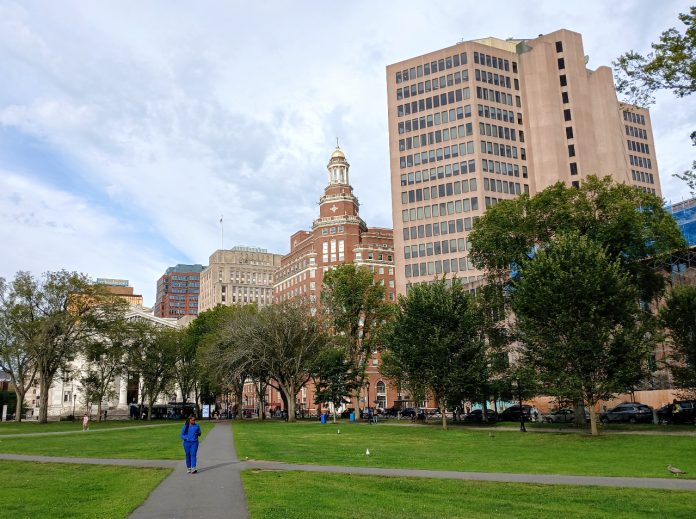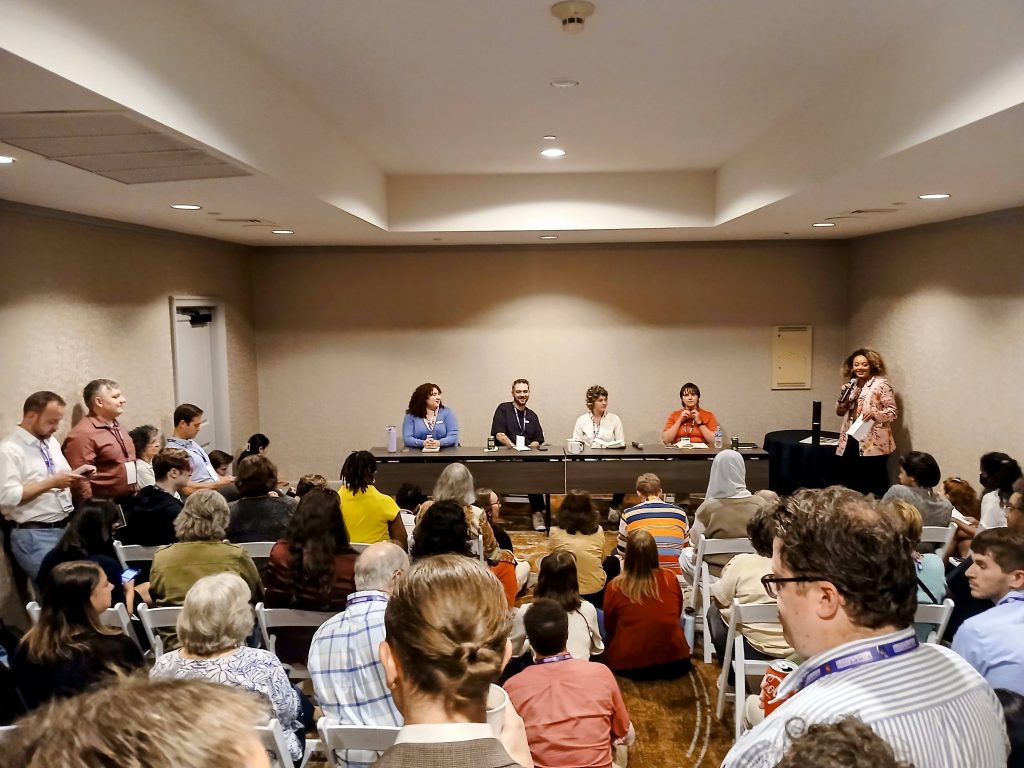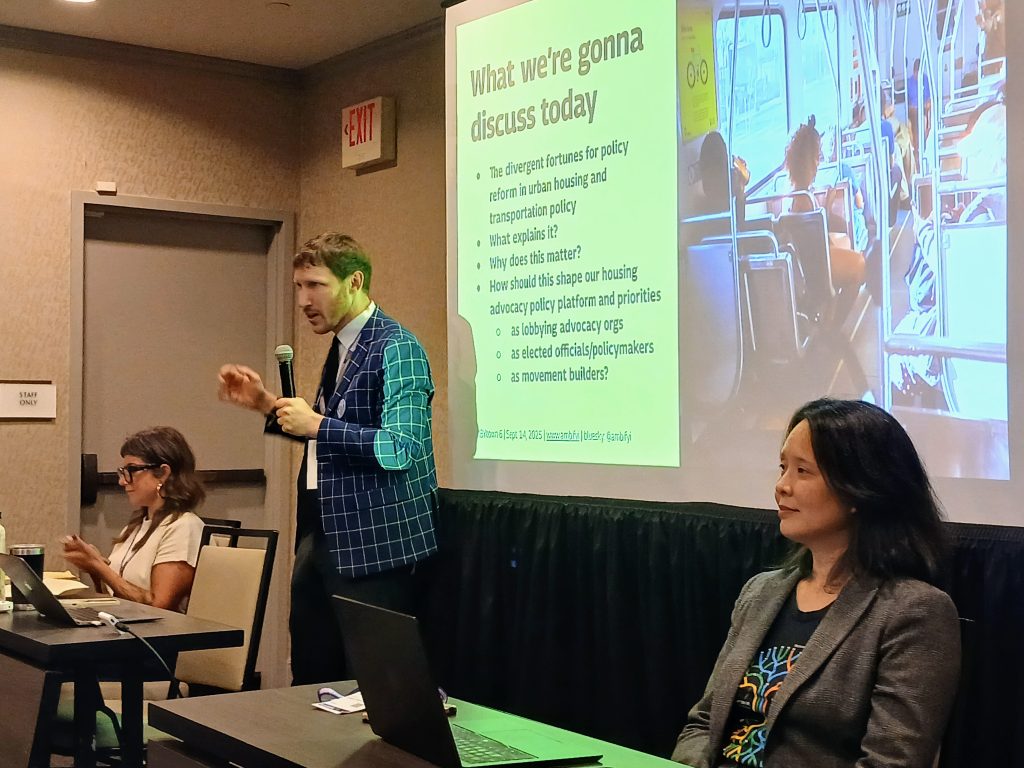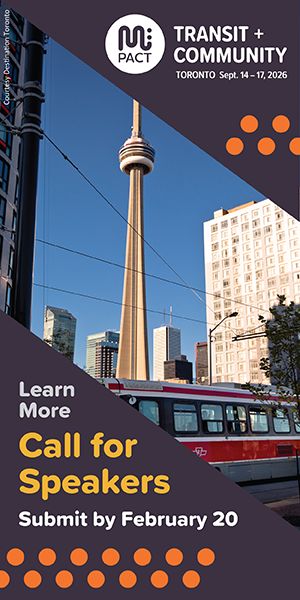
This month, housing advocates from across the country made the trek to New Haven, Connecticut for the sixth-ever YIMBYtown conference. Held at a hotel steps from Yale University, the gathering’s size was a stark comparison to the first YIMBYtown in Boulder Colorado, where a small group of grassroots organizers gathered in 2016 to strategize on how to pave the way for more homes in their communities.
This year’s YIMBYtown attracted more than 1,000 attendees, aided in large part by corporate sponsorship, and yet at its core remained a place that elevated advocate voices over those of housing industry professionals.
YIMBYtown 2025 came in with significant wind in its sails, directly following the California legislature’s approval of SB 79, a major transit-oriented development bill that will unlock significant capacity for new housing across the state. That major win — which is still pending Governor Gavin Newsom’s signature — came after other major state and local housing victories in recent years, including high-profile policy changes in Washington State.
“If you had said in Boulder ten years ago, this is going to be hosted at Yale, and there will be a thousand people and you’ll be celebrating the day after California did the biggest upzoning in god knows when,” Aaron Brown, co-mayor of YIMBYtown 2023 in Portland, Oregon, said at a panel. “This was a movement started by Bay Area activist shitposters. That is an incredible trajectory.”
“Not in my backyard” (NIMBY) activists have long dominated municipal politics across much of the country, but especially in California. YIMBYs or “yes in my backyard” activists sought to flip the script by focusing on the benefits new housing brings to the whole community.
Seattle, which has never hosted a YIMBYtown conference, nonetheless continued a strong tradition of sending a full delegation. Both Futurewise and the Housing Development Consortium, two organizations that have been heavily involved in getting Seattle’s updated Comprehensive Plan across the finish line, had contingents present.
Seattle’s Eastside was also well-represented in the form of Kirkland planning commissioner Aaron Jacobson, Kirkland City Council candidate Kurt Dresner, and former Bothell councilmember and current 1st Legislative District Representative Davina Duerr.

Pete Harrison, one of this year’s two YIMBYtown co-mayors, pointed to the success of state and local wins as a major contributor behind YIMBYtown’s size in 2025. Harrison is the Connecticut Director at the Regional Plan Association, which is focused on achieving policy wins in the New York-New Jersey-Connecticut metropolitan area.
“This is a bigger issue, and more state legislatures are dealing with it. It’s activating more organizations, and it’s also the movements winning. It’s winning in blue states and red states. So, I think success breeds more success,” Harrison told The Urbanist. “It’s a movement that’s really catching fire. They’re models now. There are different types of organizations that you can go to and say, ‘Hey, how did you do this?’ So I think that’s a lot of it.”
Attendance at YIMBYtown clearly cuts across ideological lines to some extent, as policy wonks of all stripes jump at the chance to talk about things like single-stair reform and inclusionary zoning.
“It’s a novelty, that there’s this really weird ideological diversity of libertarians and progressives,” Harrison said. “It’s this unlikely coalition, and I think there’s novelty in a very polarized environment, having Tamika Butler and [North Dakota] Governor [Kelly] Armstrong the same day at a conference is, like kind of crazy, but it works because it’s authentic.”
Yet just how big the YIMBY tent should get was a clear undercurrent across many of the conference’s panels, in the wake of the “abundance” arc dominating the political landscape following the high-profile book by Ezra Klein and Derek Thompson. That book clearly sought to turn housing abundance — at the core of the YIMBY movement for years — into a broader policy talisman.
Just a few days before, the Abundance conference took over D.C., co-hosted by groups like YIMBY Action and the Welcoming Neighbors Network. The sold-out event drew criticism for inching the abundance movement toward a more right-wing deregulatory agenda, with speakers from the Manhattan Institute and the American Enterprise Institute prominently featured. The conference also side-stepped the reason that many local advocates fight for housing reforms — in order to make their communities more equitable and welcoming.
“The lack of the discussion of race at the Abundance conference was a very conscious decision, and I think that that was a mistake,” Futurewise’s Executive Director Alex Brennan said while moderating a panel titled Abundance for Whom? Centering Racial Equity in the Abundance Agenda.
“The other piece that I think we’re trying to highlight here is, showing that a lot of the people who are doing this work at the state and local level are trying to bring together these threads of racial equity and housing abundance, even though when you filter up to the national level you don’t hear about it as much,” Brennan said.
Another consistent through line throughout the conference was transportation, and the lack of progress on advancing wins around sustainable transportation and transit compared to housing. Abundance is a much more amorphous concept in the transportation space, and much more depends on enhancing state capacity rather than creating a framework for getting out of the way and letting the private market do its thing.
One of transportation panels featured Oregon Senator Khanh Pham, fresh from a special session of the Oregon legislature that Governor Tina Kotek called after the body failed to pass a comprehensive transportation funding package during its regular session. Now the legislature is poised to adopt a smaller stopgap measure that sidesteps larger state needs like transportation safety and long-term transit funding. Pham was the only legislator to vote against adopting a sunset clause on the proposal’s transit funding, a move that all but ensures another major funding cliff down the road, on top of already certain cuts.

“We’re facing a lot of headwinds in this moment. The experience of Oregon in terms of having its transportation package fail is mirrored in a lot of other states and cities that are really struggling to fund transportation, which is probably one of the more expensive assets that states own,” Pham said. “But I tend to be optimistic, I think in every moment of crisis there’s also opportunities, because it signifies a break. Clearly the status quo way of doing things is not working, and I think people are open to new ways of thinking outside the box in how we can solve people’s problems in terms of providing access and opportunity.”
America Walks Executive Director (and former Seattle Mayor) Mike McGinn was also on hand in New Haven, popping up at a panel on fighting highway expansion projects to tout the Freeway Fighters Network, a group that America Walks stood up to fight back against the pervasive highway lobby that currently dominates the transportation space. McGinn pointed to progress that progressive transportation groups have made in starting to look more holistically at urbanist issues, two decades after he founded the group Great City.
“Now there are literally hundreds of organizations like the country that are saying, let’s do all the things that make the place great. And I think this is a trend we’re seeing. We’re seeing more active transportation groups looking at parking reform and looking at the housing issues,” McGinn told The Urbanist.
“The only way we’re going to beat them is that we’ve got to show that public demand for these policies is so strong that the elected officials can’t ignore it anymore, and that’s what the housing guys did,” McGinn continued. “Two decades ago, people told me you can’t take on single family zoning. You’re chasing a third rail. Well, they’re changing single family zoning all over the place, and they’re discovering it’s not a third rail.”
McGinn, who his opponents in the early 2010s derided as “Mayor McSchwinn” since he biked regularly and fought for bike lanes, suggested safe streets advocates could follow a similar formula.
“They could build more bike lanes and bus lanes and sidewalks, and it ain’t a third rail either, but they’re really locked into a different viewpoint of what’s politically feasible. And they’ve got a bunch of very powerful actors, both on the business side and on the labor side, who’ve got them locked in.”
“So we’ve got to build a stronger coalition,” McGinn said. “And in that regard, the YIMBY movement is showing it can be done.”
Ryan Packer has been writing for The Urbanist since 2015, and currently reports full-time as Contributing Editor. Their beats are transportation, land use, public space, traffic safety, and obscure community meetings. Packer has also reported for other regional outlets including BikePortland, Seattle Met, and PubliCola. They live in the Capitol Hill neighborhood of Seattle.


